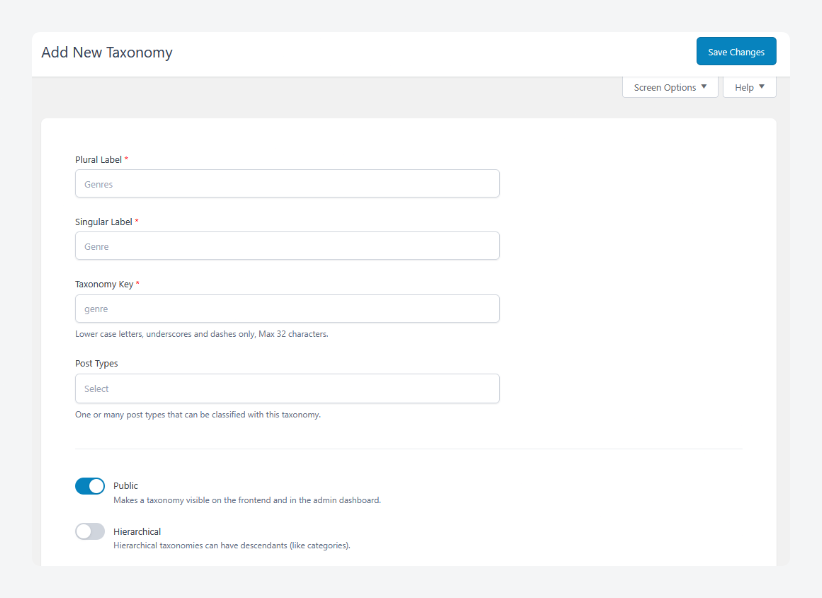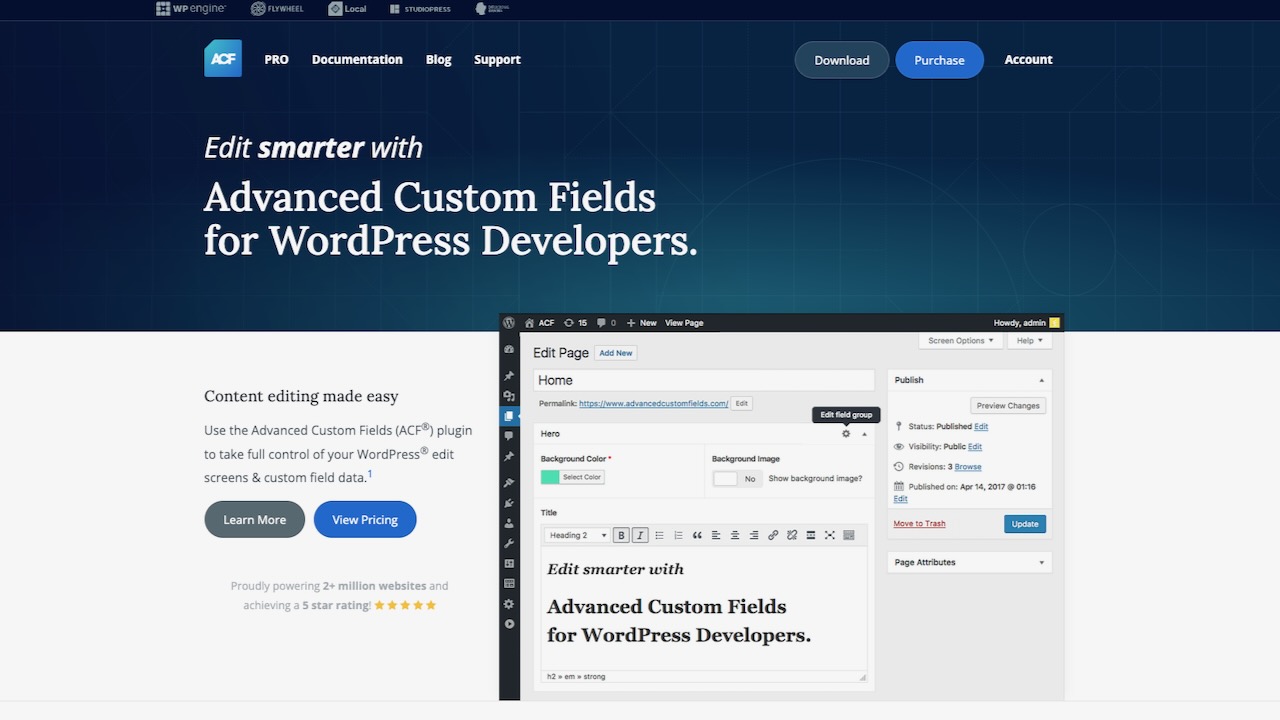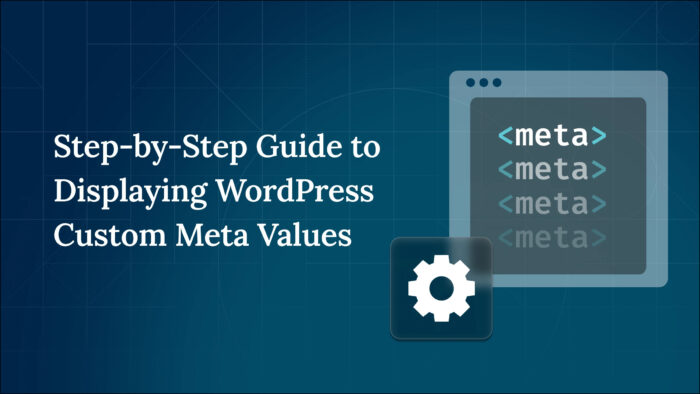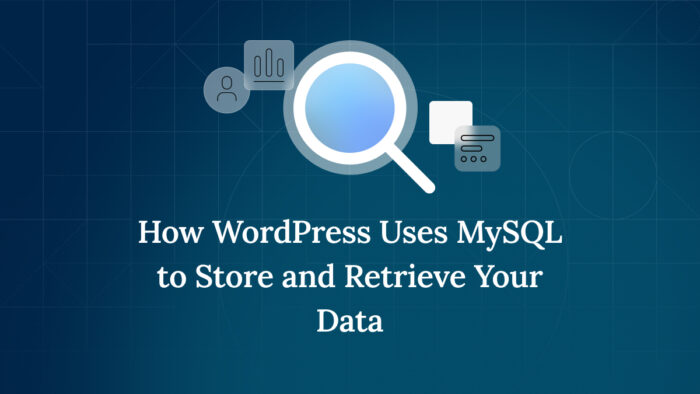Key points:
- Meta queries let you filter WordPress posts by custom field data, but can severely impact performance if not optimized.
- Choose the right storage method: use taxonomies for filterable data, custom tables for complex structures, and post meta only when necessary.
- Optimize database performance by adding proper indexes and using efficient query operators.
- Implement caching strategies to reduce database load, especially for frequently accessed data.
- Advanced Custom Fields (ACF®) provides better data structure and performance, especially when combined with custom tables for large-scale sites.
WordPress custom fields are where the CMS can hide some heavy artillery. Toggle them on, and an ordinary post suddenly sports an event date, a price tag, a user-specific quirk – whatever your build demands. That single feature turns WordPress from a blogging engine into a data platform.
But power breeds friction. Once a site is stuffed with thousands of custom-field rows, finding exactly the right posts is no longer trivial. The meta queries that make those fields useful begin to drag like a bad connection, ballooning load times, and hurting the user experience.
This guide is a practical fix. First, we’ll lay out some best practices – proper indexing, tight comparisons, and query caching – that keep your meta lookups fast. Then we’ll step into advanced territory: layered conditions, date math, and edge-case filtering that scales instead of stalls.
We’re also bringing Advanced Custom Fields (ACF®) to the table because it encourages standardized keys, enforces consistent data types, and exposes hooks that let you pre-optimize every request. In short, it lets you spend less time firefighting slow queries and more time building features users notice.
Understanding WordPress meta queries
Meta queries in WordPress are the key to unlocking the full potential of your custom fields, also known as post meta.
They allow you to retrieve posts based on specific custom field values. This is what lets you filter and display content based on criteria that would be nearly impossible to achieve with default WordPress query options alone.
Imagine wanting to display all upcoming events, filter products priced under a certain amount, or highlight posts authored by guest writers. A meta query makes these dynamic filters possible by tapping into the data stored in your custom fields.
WordPress handles this data at the database level, allowing for powerful and flexible content retrieval that can be tailored to your needs.
Common performance challenges
Meta queries can quickly turn into performance nightmares if not managed carefully. Here are some common causes of performance issues:
- Database structure causes inefficiency in meta queries because WordPress stores metadata in a key-value pair format, requiring complex joins and table scans for queries that involve multiple meta keys or values.
- Key-value structure overhead results in slower queries as each meta query condition triggers additional JOINs or table lookups, increasing query execution time and taxing the database.
- Poor scalability impacts performance as the number of posts and metadata grows, making queries increasingly slow, particularly when non-indexed or textual custom fields are involved.
- Indexing issues arise because the
meta_valuefield is stored as longtext, preventing effective indexing and causing delays in numeric searches or queries that filter large datasets. - Data type comparisons hinder query efficiency when numeric conditions are applied to text-based fields, leading to slower processing and incorrect sorting due to mismatched data types.
- Caching limitations arise because dynamic or complex meta queries with varying conditions are difficult to cache effectively, forcing the database to process the same query repeatedly.
The anatomy of efficient meta queries: Structure, parameters, and operators
Efficient meta queries in WordPress start with a solid understanding of the core parameters in the WP_Query class. They optimize performance and ensure the queries remain readable.
Here are its key parameters:
meta_keyspecifies the custom field you wish to filter posts by (e.g., event date, author bio, product price).meta_valuedefines the value of the custom field you’re matching.meta_comparecontrols how WordPress compares the provided meta value (e.g.,=,!=,>,<,IN,NOT IN,BETWEEN,LIKE).meta_queryallows advanced combinations and nesting of multiple meta conditions, providing powerful flexibility.
For example, a simple query might look like this:
$args = array(
'post_type' => 'event',
'meta_key' => 'event_date',
'meta_value' => '2025-03-13',
'meta_compare' => '>=',
'orderby' => 'meta_value',
'order' => 'ASC'
);
$query = new WP_Query( $args );In this example, WordPress retrieves all upcoming events based on the custom field event_date and orders them by date in ascending order.
Best practices for optimizing meta queries
Meta queries can do a lot, but you can squeeze more power out of them with the following best practices:
Choose the right data structure
If you’re dealing with data that will frequently be used for filtering, don’t rely on custom fields – use taxonomies instead. Taxonomies are specifically built for categorization and filtering, which means they’re inherently optimized for those operations.
In WordPress, taxonomies come with their own database tables and indexes designed to handle filtering efficiently. This is important because filtering on custom meta fields can quickly turn into a performance nightmare.
Meta queries are flexible, but they can also become slow and resource-hungry, especially when dealing with large datasets. Taxonomies, on the other hand, offer much better performance for filtering, as they’re indexed and organized with these use cases in mind.
So, before you default to custom fields for everything, step back and think: will this piece of data need frequent filtering? If the answer is yes, taxonomies will serve you better in the long run. It’ll improve performance while making your code neater and more scalable.
The built-in options probably won’t be enough for you, but you can create custom taxonomies using ACF, all within a beginner-friendly UI.

Implement smart caching
Repeated database queries can be a serious performance bottleneck, especially when you’re dealing with complex meta queries.
The solution is object caching, which lets you tap into WordPress’s object cache API to store the results of expensive queries in memory, reducing the load on your database for repeated requests.
When paired with a persistent caching solution like Redis or Memcached, this strategy can make a huge difference. These systems allow you to cache data across requests, so the next time the same query is made, WordPress can fetch the results from memory instead of hitting the database again.
This dramatically reduces query execution time and alleviates strain on your database, especially for high-traffic sites where performance matters.
The key here is caching the right data. Cache your meta queries, but also be mindful of cache expiration to ensure you’re not serving outdated information.
Optimize query structure
The more complex your query, the heavier the toll it takes on performance. Every additional condition in a meta_query adds more layers to the query, making it slower and more resource-intensive.
Instead of piling on conditions, break down complex queries into multiple simpler ones. This reduces the burden on the database and can help with speed.
This is especially important when you’re working with nested conditions or using compare operators like LIKE or BETWEEN. These operators are notoriously slow because they can’t take full advantage of indexes.
If you can, opt for exact matches or equality comparisons. They allow WordPress to leverage the database indexes more efficiently, cutting down on query time.
If you really need to use complex operators, consider whether the query can be split into multiple steps. For example, you could run a simple query first, retrieve a smaller set of posts, and then run a secondary query on the results.
Enhance pagination performance
When displaying paginated results, the way you handle queries can have a major impact on load times and user experience.
Start by using reasonable values for the posts_per_page parameter. Avoid setting it to -1, as this will return all posts at once and create unnecessary strain on your server, especially with large datasets. Stick to a sensible limit that balances performance with usability.
Another optimization trick is to implement the no_found_rows parameter in your query when you don’t need the total count of posts. By default, WordPress counts all posts for pagination, but if you don’t need this count (for example, when using AJAX or infinite scroll), setting 'no_found_rows' => true reduces the query workload.
Speaking of infinite scroll, consider implementing it as an alternative to traditional pagination. Infinite scroll allows new content to be loaded dynamically via AJAX, reducing the initial page load time and improving the user experience. This is especially useful for content-heavy sites where loading a full paginated list can take time.
Avoid common bottlenecks
First, avoid overusing the LIKE operator, especially with wildcards like %keyword%. This forces WordPress into expensive database scans, which can slow down your site, especially as the database grows.
If you can, stick to exact matches or find alternative methods like using full-text indexes or more specific filters.
Another bottleneck occurs when you combine multiple nested queries without proper optimization. When you pile on conditions without careful thought, it can significantly increase the query’s complexity and execution time.
And, instead of creating overly complicated queries, try simplifying them or breaking them into multiple steps.
Lastly, querying serialized data is another performance killer. Serialized arrays or objects are difficult to query efficiently, as WordPress has to unserialize and search through the data.
The better approach is to use structured custom fields, like those provided by ACF, which store data in formats that are much easier to query.
Supercharge Your Website With Premium Features Using ACF PRO
Speed up your workflow and unlock features to better develop websites using ACF Blocks and Options Pages, with the Flexible Content, Repeater, Clone, Gallery Fields & More.
Optimizing database structure for faster meta queries
Because meta queries interact directly with your database, the way your custom fields are stored and indexed profoundly impacts query speed and efficiency.
To boost the performance of your meta queries, consider the following database optimization strategies:
Database indexing for custom fields
WordPress doesn’t automatically index meta keys or meta values, which means if you’re frequently querying specific fields, you’ll need to manually add indexes to improve performance.
Without indexes, WordPress has to scan the entire wp_postmeta table, which can significantly slow down query times, especially as your database grows.
For example, if you often query by a custom field like event_date, adding an index to this field can make a huge difference. The query below creates an index on the meta_key and meta_value columns, improving the speed of lookups for that specific field:
ALTER TABLE wp_postmeta ADD INDEX meta_key_value (meta_key(191), meta_value(20));This helps WordPress pinpoint matching records quickly, reducing the workload on the database and speeding up SQL query execution.
When adding indexes, follow these best practices:
- Only index fields frequently used in queries or sorting conditions.
- Avoid indexing fields with long or highly variable values, as this can cause storage and performance overhead.
- Regularly review and remove unused or redundant indexes to maintain optimal database efficiency.
Custom tables vs. post meta: When and how to implement alternative storage solutions
While indexing meta fields can significantly improve performance, very large or complex sites might benefit from moving beyond the default meta storage and implementing custom tables.
Custom tables allow you to design a database structure that’s optimized for your specific data, complete with the right indexes and relationships, which can greatly speed up query performance. This approach lets you eliminate the inefficiencies inherent in the key-value structure of the default wp_postmeta table.
Consider using custom tables:
- When querying serialized or complex data structures frequently.
- If the post meta table grows excessively large and slows down database queries.
- When custom data structures don’t fit neatly into WordPress’s standard meta architecture.
How ACF enhances meta query performance and development

Compared to storing complex data in serialized formats using standard custom fields, ACF’s specialized field types (like repeaters, flexible content, and relationships) provide more efficient ways to store and retrieve structured data.
This organization reduces the need for complex, inefficient queries against serialized data and allows developers to access exactly the information they need without unnecessary overhead.
Custom database tables
When dealing with large amounts of content, querying the wp_postmeta table can become slow and inefficient.
For example, using ACF’s repeater field adds many entries to the post_meta table, which can significantly impact query performance.
To solve this, you can move the data into a custom table, either manually or using plugins like ACF Custom Database Tables.
Two-step query pattern for maximum performance
The two-step query pattern is a powerful approach when using custom tables with ACF to achieve maximum performance. Here’s how it works:
// Step 1: Query the custom table directly to get matching post IDs
global $wpdb;
$post_ids = $wpdb->get_col($wpdb->prepare(
"SELECT ID FROM your_custom_table
WHERE price < %d",
100
));
// Step 2: Use the post IDs in a standard WP_Query
$args = array(
'post_type' => 'product',
'post__in' => $post_ids,
'orderby' => 'post__in'
);
$query = new WP_Query($args);This two-step process allows for high-performance filtering. First, you use raw SQL against your custom table to quickly gather the post IDs, then use those IDs in a WP_Query to fetch the posts. This approach bypasses the inefficiencies of querying large meta tables and leverages WordPress’s optimized post retrieval system.
Performance testing shows that this pattern can reduce query times for complex queries against large datasets from over 5 seconds to under 1.5 seconds, making it a highly effective solution for large-scale sites.
One real-world use case involves using it to work with data in WooCommerce HPOS, which is now available!
ACF 6.4: WooCommerce HPOS integration and field value storage refactoring
• ACF 6.4 includes native support for WooCommerce’s High-Performance Order Storage (HPOS) system, which moves order data from the wp_posts and wp_postmeta tables to dedicated custom tables. This integration allows ACF fields to work seamlessly with WooCommerce orders stored in these custom tables, maintaining all the benefits of ACF’s interface and API while leveraging the performance advantages of HPOS.
• Beyond HPOS support, ACF 6.4 includes a major refactoring of how field values are stored and retrieved. This architectural change reduces the number of database queries required to access field data and creates a more flexible foundation for future custom storage integrations. The improvements will benefit all ACF users, even those not using WooCommerce, with more efficient data retrieval patterns that reduce page load times and server resource utilization.
Supercharge your WordPress custom fields with ACF
Mastering meta query optimization is how you keep your WordPress site fast and responsive as it grows.
ACF takes the guesswork out of managing custom data, storing it in a way that’s built for efficiency. This structured approach gives you a clear advantage over traditional post meta, which is messy and slow.
When you pair ACF with custom database tables, the performance boost is even more significant. You’re making your queries easier to manage and scale, not just speeding them up.
If you’re serious about improving your site’s performance and development process, ACF is the tool you need. Download ACF and start optimizing your meta queries today.





For plugin support, please contact our support team directly, as comments aren't actively monitored.